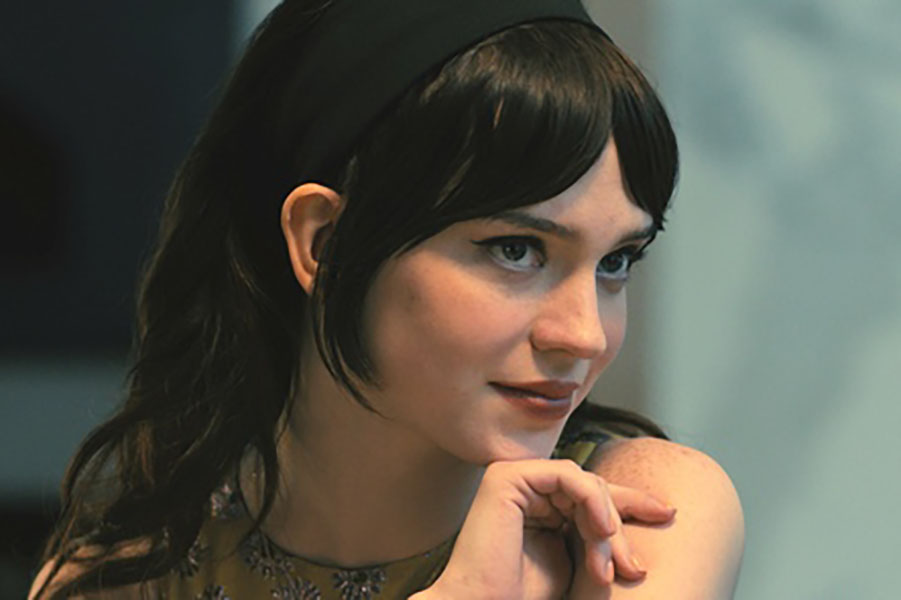5.0 out of 5.0 stars
“Companion” is one of the best multifaceted horror movies to be released in recent times, and is full to the brim with shock factor. After hitting theaters Jan. 31, the film showcases the genre’s ability to tackle systemic issues like misogyny and real-world fears about artificial intelligence.
The opening lines of the movie are in the words of the main character and robot, Iris, played by Sophie Thatcher. She says the two happiest moments of her life were the day she met Josh, and the day she killed him. Josh, played by Jack Quaid, is an upper-class man who is revealed to be an egotistical misogynist who can’t handle his own faults and who falls victim to the technology available to customize his very own “companion.”
Iris is unaware of her programming thanks to Josh, and she is helplessly in love with him. Thatcher captures the sickening look of heart-struck love on Iris’s face painfully well, showing the all-consuming obsession she is programmed to have for him.
While anyone who watched the trailer would know that Iris is a robot from the start, the movie doesn’t explicitly reveal this until Iris realizes it herself. The audience also almost forgets that Iris eventually murders Josh, despite Iris saying she does in the opening lines of the movie.
“Companion” quickly shows its teeth at Iris’s first murder, a man who had been sexually assaulting her. This also happens to be the boyfriend of one of Josh’s friends, Kat (Megan Suri). By turning up Iris’ aggression programming, Josh and his friends set her up to murder him so that they can steal his money. Soon after, Josh reveals to Iris that she isn’t human, and she realizes he is going to shut her down unless she escapes.
Some of the lines in this movie beg the audience to consider heavy topics. The disregard of Iris’ ability to be more than a tool for Josh who cannot function on her own or without programming mirrors systemic issues of sexism today. When Josh first purchases Iris as a rental, he is told by the delivery man that she will never know she is a robot. He tells Josh, “She’ll be so focused on you, your wants, it’ll never even occur to her.”
Kat tells Iris that the idea of a robot companion makes her feel replaceable. Kat is fed up with the antics of Josh and their other friend Eli (Harvey Guillén) whose boyfriend, Patrick, is revealed to be a robot late in the film. The companions in this world are so realistically portrayed as human that this reveal is a genuine shock in the theater.
Kat’s death is a beautifully framed scene, both in cinematography and concept. Patrick stabs her when Josh orders him to prevent Kat from escaping. At this point in the film, Josh is obviously the true villain. After being stabbed, Kat lays down on the couch next to an immobilized Iris. These two women on the brink of death — who don’t know the value in their identity and who pine to be more like the other for the satisfaction of a man — is a bittersweet parallel. Both women are being treated like inhuman sex toys by their respective partners, despite their differences in human and robot anatomy.
The deaths and injuries in this film are snappy and thrilling, often catching the audience off guard with seemingly small injuries that carry a hefty kick, such as crushed fingers or feet. By the end of the movie, the viewer is well aware of why it earns its place in the horror category. At the same time, the gore and blood never feel overdone.
“Companion” paces its horrific scenes well and allows for a fully developed story to surface beneath the violence and thrill. Some scenes don’t let the audience escape the alarming horror and force the viewer to sit in discomfort. At one point, Josh tells Iris to hold her hand over a burning candle, and she cannot deny him. As if she is merely an afterthought to him, Josh is interrupted by a phone call and momentarily forgets about her as her arm catches on fire. Iris can feel the physical pain, though her reaction implies it might be less than a human would feel.
This film proves that a horror movie doesn’t need to consist of grossly overdramatized gore and superficial violence. The story and the themes behind the terror are what really solidify the film’s significance in the genre. The film even includes witty humor and funny moments that don’t draw away from the story.
The soundtrack for the film is also perfectly chosen. In one scene, while Iris is being rebooted after her almost-death, and Patrick — the other A.I. companion — is going on a killing rampage at Josh’s whim, the love song “You Showed Me” by The Turtles plays. Hearing the lyrics about falling in love while watching these two companions built for that function aggressively resist their loving side is unsettling and a great juxtaposition.
After killing Josh at the end of the film, Iris finally sees her own robotic hand, peeling away her burnt flesh to reveal it. As she does this, Thatcher speaks over the scene, saying that she has finally found meaning in life. Iris has been through the unimaginable to finally gain her autonomy. She has felt love alongside mental and physical pain and has proven some sense of self-realization. Her character makes the audience consider what makes us human.
Following the footsteps of movies like “Ex Machina” and the common trope of violence ensuing among friends trapped together, “Companion” successfully delivers thrill, humor, blood and gut-wrenching writing.





















